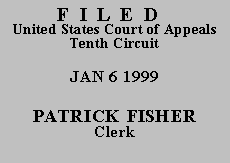

|
UNITED STATES OF AMERICA, |
|
This case is before the court on pro se petitioner Dale Robertson's application for a certificate of appealability pursuant to 28 U.S.C. § 2253(c). Robertson seeks to appeal the district court's denial of Robertson's 28 U.S.C. § 2255 petition for post-conviction relief. Because Robertson has failed to make a substantial showing of the denial of a constitutional right, this court denies Robertson a certificate of appealability and dismisses this appeal.
In 1991, Robertson was indicted on federal bank robbery and weapon charges. Prior to his trial, Robertson was involved in a serious automobile accident and was in a coma for thirty-one days. As a result of the accident and coma, Robertson lost his memory of events occurring during the time period of the indictment. Nevertheless, after a hearing on the issue, the trial court concluded that Robertson was competent to stand trial and competent to assist his counsel. Ultimately, a jury convicted Robertson on all three counts of the indictment. On appeal of his conviction to this court, Robertson raised the following issues: (1) a confession he gave in the hospital after the accident was involuntary and obtained in violation of Miranda; (2) the procedures utilized for an in-court identification were unduly suggestive; and (3) the trial court abused its discretion in admitting the testimony of two government witness. United States v. Robertson, 19 F.3d 1318 (10th Cir. 1994). Upon review of the issues raised by Robertson, this court affirmed his convictions. Id. at 1325.
On May 18, 1998, Robertson filed a motion to "vacate" his sentence pursuant to § 2255. As grounds for the petition, Robertson argued as follows: (1) newly discovered evidence in the form of recovered memories, proved he is innocent of the crimes for which he was convicted; and (2) his trial counsel was ineffective. After ordering Robertson to file a supplemental brief on the issue of the newly recovered memories, the district court issued an order denying relief. As to Robertson's claim regarding the newly discovered memories, the district court concluded the claim simply alleged Robertson was factually innocent. According to the district court, "A claim of factual innocence based on newly discovered evidence is not sufficient to support relief under § 2255 without a claim of a constitutional or legal violation in the trial of the case." Dist. Ct. Order at 2 (citing Guinan v. United States, 6 F.3d 468, 470 (7th Cir. 1993); see also Sellers v. Ward, 135 F.3d 1333, 1338-39 (10th Cir. 1998) (holding in a § 2254 case that a claim of actual innocence is not a basis for federal habeas corpus relief no matter how convincing the evidence). As to Robertson's claim of ineffective assistance, the district court concluded the claim should be denied on two grounds. First, Robertson filed his petition well outside the limitations period set out in 28 U.S.C. § 2243(d). Furthermore, Robertson had not alleged a government created impediment to the bringing of a timely ineffective assistance claim nor that the facts necessary to the claim were only recently discovered or discoverable. See 28 U.S.C. 2243(d)((1)(B), (D). Second, Robertson's claim of ineffective assistance was far too conclusory to merit a hearing or further treatment.(1)
Under § 2253, Robertson's appeal may not be considered unless he first obtains a certificate of appealability. A certificate of appealability will issue only if the issues raised in the petition are debatable among jurists of reason, if a court could resolve the issues differently, or if the questions presented are deserving of further proceedings. See Barefoot v. Estelle, 463 U.S. 880, 893 & n.4. (1983). Upon review of Robertson's application for a certificate of appealability and appellate brief, the district court's Order, and the entire record on appeal, this court concludes, for substantially the same reasons set forth in the district court's Order dated June 29, 1998, that Robertson cannot satisfy this burden and is not entitled to a certificate of appealability.
Robertson's application for a certificate of appealability is DENIED and this appeal is DISMISSED.
ENTERED FOR THE COURT:
Michael R. Murphy
Circuit Judge
*. This order and judgment is not binding precedent, except under the doctrines of law of the case, res judicata and collateral estoppel. The court generally disfavors the citation of orders and judgments; nevertheless, an order and judgment may be cited under the terms and conditions of 10th Cir. R. 36.3.
1.The entire extent of Robertson's allegations with regard to this claim are as follows: "I could not, nor would my attorney allow me to assist him in defending me."